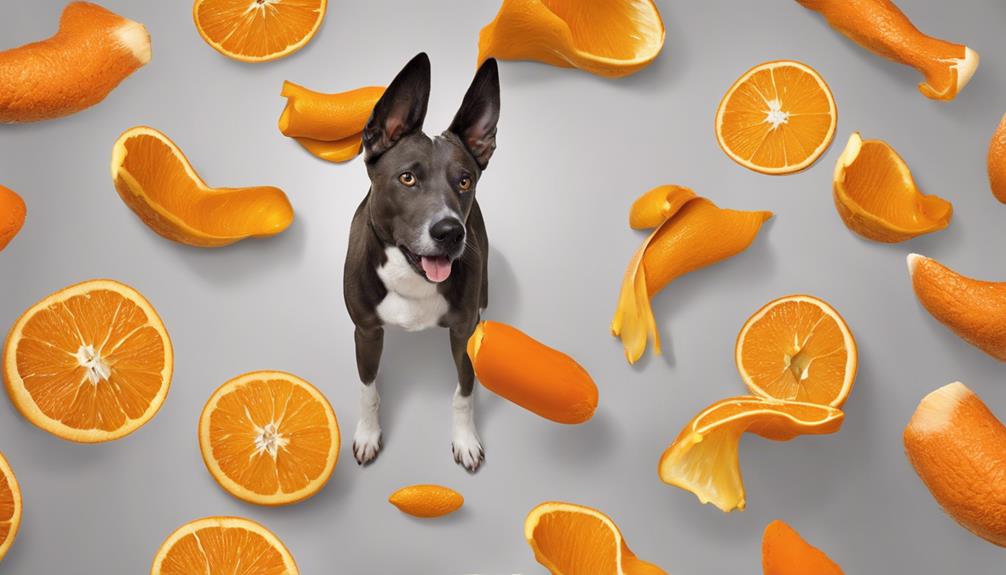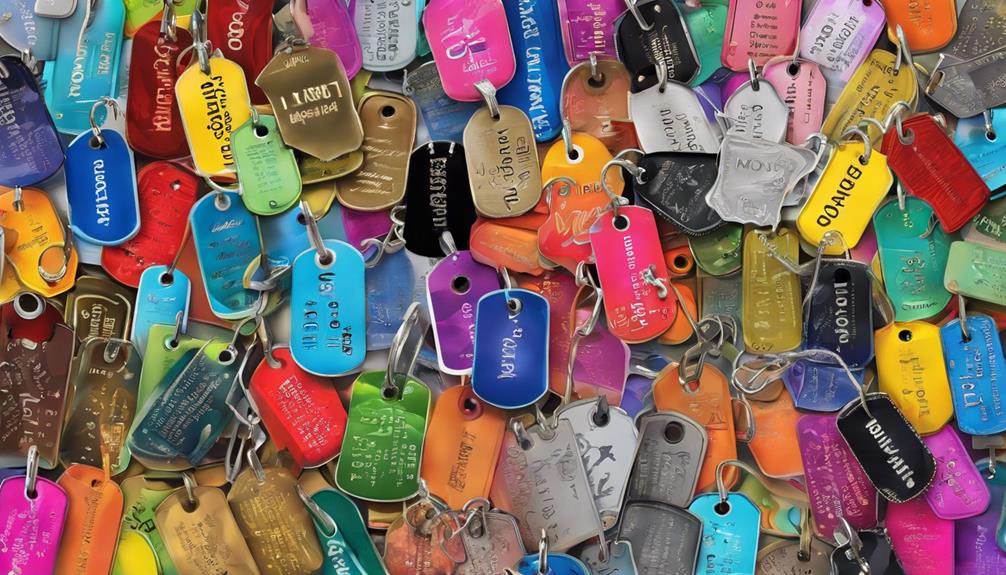Yes, dogs can have oranges, but it’s important to do so carefully. Their juicy flesh is safe, but it’s best to avoid feeding them the peel. Always remember, moderation is key to prevent stomach problems. Keep an eye out for any digestive reactions, and if you’re worried, consult a vet for advice. To learn more about the pros and cons of feeding oranges to your furry friend, continue reading.
Key Takeaways
- Safe to offer juicy flesh, not peels.
- Moderation is crucial to prevent issues.
- Watch for any gastrointestinal reactions.
- Consult a vet for personalized advice.
- Remove seeds and white film before feeding.
Oranges and Dogs: What You Need to Know
When it comes to dogs and oranges, it's important to understand the essential facts for their well-being. Dogs can eat oranges as a healthy treat due to their richness in essential vitamins and minerals like calcium, Vitamin C, and potassium. However, it's vital to remember that moderation is key. Before feeding oranges to your dog, make sure to remove the peels and seeds to prevent any potential digestive issues.
Oranges can be an invigorating and nutritious snack for your furry friend, but overfeeding can result in gastrointestinal upset such as vomiting and diarrhea. It's always a good idea to consult with a veterinarian before introducing oranges into your dog's diet, especially if they have any specific health conditions that might be affected.
Risks of Feeding Oranges to Dogs

Oranges can pose risks to dogs due to potential digestive issues and allergic reactions.
It's crucial to watch your dog closely when introducing oranges into their diet to make sure they don't experience any adverse effects.
Remember to remove all seeds and limit orange intake to prevent any stomach upset or weight gain.
Potential Digestive Issues
To prevent potential digestive issues in dogs, it is important to introduce oranges gradually and monitor their stomach reactions closely. Dogs can experience upset stomachs from the moderate sugar content in oranges. Removing the peel and seeds before feeding your dog can help prevent digestive problems. If you notice any unusual behavior after your dog eats an orange, stop feeding them immediately. It's essential to limit orange intake to no more than 10% of their daily calories to avoid digestive upset and weight gain. Below is a table summarizing key points about feeding oranges to dogs:
| Key Point | Description | Importance |
|---|---|---|
| Introduce Oranges Slowly | Monitor stomach reactions closely to prevent issues | High |
| Remove Peel and Seeds | Helps prevent digestive problems in dogs | Medium |
| Limit Orange Intake | Prevents digestive upset and weight gain in dogs | High |
Allergic Reactions Possible
We must be watchful for potential allergic reactions in dogs when introducing oranges into their diet. Allergic reactions in dogs can manifest as itching, hives, swelling, or even anaphylaxis. These reactions may vary in intensity and could appear shortly after the dog consumes oranges.
In severe cases, allergic responses might require immediate veterinary care to prevent complications. It's essential to observe your dog carefully after giving them oranges to watch for any signs of allergic reactions or sensitivities. If you notice any unusual symptoms like excessive scratching, redness, or difficulty breathing, consult your veterinarian promptly.
Being mindful of these possible allergic reactions can help safeguard your dog's well-being when incorporating oranges into their diet.
Benefits of Oranges for Dogs

When contemplating the benefits of including oranges in a dog's diet, it's important to acknowledge the variety of important nutrients these fruits provide. Oranges are brimming with essential vitamins and minerals like calcium, copper, iron, and potassium. One standout nutrient in oranges is Vitamin C, which plays a significant role in boosting the immune system and promoting overall health in dogs. While commercial dog foods typically contain all the necessary nutrients, offering oranges as an occasional treat can add a nutritious twist to your pup's diet.
However, it's essential to remember that moderation is key. Feeding too many oranges can lead to gastrointestinal upset in dogs. Hence, it's best to limit the amount of oranges given to your furry friend. As a healthy alternative to traditional dog treats, oranges can provide a tasty snack packed with essential nutrients when offered in appropriate portions. Remember to consult your veterinarian before introducing oranges to your dog's diet to make sure it aligns with their individual health requirements.
Safe Ways to Give Oranges to Dogs

When giving oranges to dogs, remember to always remove the peel and seeds to prevent any potential digestive issues.
It's best to start slowly by offering just a single slice to see how your furry friend reacts to this new treat.
Keep a close eye on your dog for any signs of stomach upset and only give oranges in moderation, making sure they don't exceed 10% of their daily calories.
Oranges for Canine Consumption
Incorporating oranges into a dog's diet as an occasional treat can provide essential nutrients like Vitamin C, potassium, and fiber. Oranges are beneficial for dogs in moderation, but it's essential to remove the peel, seeds, and white film before feeding them to your furry friend.
Excessive orange intake can upset a dog's stomach, so it's advisable to limit it to no more than 10% of their daily diet. Before introducing oranges into your dog's diet, consult a veterinarian, especially if your dog has specific health concerns.
Serving Size for Safety
For safe ways to give oranges to dogs, consider the important serving size to prevent any digestive issues. Dogs can safely enjoy one to three orange slices as a treat, making up no more than 10% of their daily diet.
Remember to remove the peel, seeds, and white film on the flesh before feeding your dog to avoid causing gastrointestinal upset. Overfeeding oranges can lead to vomiting, diarrhea, and abdominal pain, so it's vital to practice moderation.
When introducing oranges to your dog, start slowly to monitor for any signs of digestive upset. If your dog has diabetes or a sensitive stomach, consult a veterinarian before incorporating oranges into their diet to guarantee their safety and well-being.
Quantity Guidelines for Dogs and Oranges

To ensure a dog's well-being, it's important to adhere to specific quantity guidelines when offering oranges as a treat. Oranges are beneficial for dogs as they're packed with essential nutrients like Vitamin C, potassium, and fiber. However, feeding your furry friend one to three orange slices at a time is essential to ensuring they enjoy this healthy snack without causing gastrointestinal upset.
Overindulging in oranges can lead to tummy troubles such as vomiting, diarrhea, and abdominal pain in dogs. Remember, moderation is vital when it comes to sharing oranges with your canine companion. Always keep in mind that oranges should make up no more than 10% of your dog's daily diet to prevent any adverse effects.
Consult your veterinarian before introducing oranges to your dog, especially if they've underlying health conditions. Puppies can also enjoy oranges once they're on solid foods, but be sure to offer them very small amounts to avoid any digestive issues.
Orange Peels and Dogs: Risks and Precautions

Let's shift our focus to the potential risks and precautions associated with feeding orange peels to dogs. Orange peels may contain toxic compounds that are harmful to our furry friends. These compounds can lead to digestive upset, including vomiting and diarrhea. Additionally, dogs may have difficulty digesting orange peels, which can result in blockages in their gastrointestinal tract. It's important to remove the peel, seeds, and white film on the flesh before giving oranges to dogs to avoid these issues.
The oils present in orange peels can also cause serious gastrointestinal upset in dogs, leading to dehydration and discomfort. If ingested, peels and seeds from oranges can trigger vomiting and diarrhea, making your pet feel unwell. To keep your dog safe and healthy, it's best to steer clear of feeding them orange peels altogether. Always stick to feeding your dog the juicy flesh of the orange in moderation to prevent any potential problems.
Can Dogs Safely Have Orange Juice?

Is orange juice safe for dogs to consume considering its high sugar and citric acid content? While orange juice may seem invigorating, it's paramount to avoid giving it to your furry friends. Here's why:
- High Sugar Content: Orange juice contains a substantial amount of sugar, which can impact a dog's blood sugar levels and overall health.
- Citric Acid: The citric acid in orange juice can lead to stomach upset, diarrhea, or vomiting in dogs, causing discomfort and potential health issues.
- Seek Advice from a Veterinarian: It's crucial to seek advice from a veterinarian for guidance on suitable and safe hydration options for dogs. They can offer recommendations on the best ways to keep your dog hydrated without jeopardizing their well-being.
To keep your dog healthy and content, opt for water as the primary source of hydration and refrain from offering them orange juice. If you have any concerns about your dog's diet or hydration needs, always seek professional advice from a veterinarian.
Introducing Oranges to Your Dog

When introducing oranges to your dog, always start by offering a small slice to observe their reaction closely. It's crucial to monitor your furry friend for any signs of gastrointestinal (GI) upset, such as vomiting or diarrhea. Remember to remove the peel, seeds, and white film on the flesh before feeding oranges to your dog. Limit the amount of oranges to no more than 10% of your dog's daily calories to prevent digestive issues. If you notice any adverse reactions or if you have concerns about whether oranges are harmful to your dog, consulting a veterinarian is always a wise decision.
| Oranges for Dogs | |
|---|---|
| Start small | Observe |
| Monitor closely | Remove peel |
| Limit intake | Consult vet |
Introducing fruits like oranges to your dog should be done in small quantities to avoid any potential harm to your dog's digestive system. Remember, a little caution goes a long way in keeping your furry companion happy and healthy.
Other Citrus Fruits for Dogs

Introducing other citrus fruits like grapefruit, tangerines, and clementines can also be safe for dogs when offered in small amounts without seeds or peels. While these fruits can be a tasty and rejuvenating snack for your furry friend, it's vital to keep in mind the importance of moderation in their diet.
Here are some key points to ponder when giving your dog other citrus fruits:
- Citrus Fruits Variety: Grapefruit, tangerines, and clementines are safe options for dogs in small, peeled, and seedless amounts.
- Moderation is Key: Even though dogs may enjoy citrus fruits, it's crucial to provide them in moderation to prevent any stomach upset.
- Consult with a Veterinarian: Before introducing any new citrus fruits or unfamiliar foods to your dog, always consult with a veterinarian to confirm they're safe and suitable for your pet's diet.
Keep a close eye on your dog for any signs of allergic reactions or gastrointestinal discomfort when treating them with citrus fruits. Remember, a happy and healthy pup is a well-cared-for pup!
Frequently Asked Questions
Is Orange Safe for Dogs?
Oranges are secure for dogs in moderation. They contain vital vitamins and minerals like Vitamin C and potassium, which can benefit dogs' health. However, overfeeding can lead to gastrointestinal upset.
Make sure to eliminate seeds before feeding oranges to your furry friend. Consult a veterinarian before adding oranges to your dog's diet for safety and moderation. It's always best to safeguard your dog's well-being with expert advice.
Why Can't Dogs Eat Citrus?
Dogs can't eat citrus fruits like oranges due to their inability to properly digest the high levels of citric acid present. This can lead to gastrointestinal upset, such as vomiting and diarrhea, as their stomachs are sensitive to the acidity.
Additionally, the essential oils in citrus fruits can cause skin irritation in some dogs. To keep our furry friends healthy and happy, it's best to avoid feeding them oranges and other citrus fruits.
Can Dogs Have Satsumas?
Yes, dogs can enjoy satsumas in moderation. These mandarin oranges are a nourishing snack for dogs, packed with Vitamin C, fiber, and antioxidants. Remember to remove the peel and seeds before offering satsumas to your furry companion.
Introduce them gradually to watch for any negative responses and prevent stomach issues. Satsumas can be a delicious and nutritious occasional indulgence for dogs, offering a revitalizing change to their diet.
Can Dogs Eat Mandarins?
Yes, dogs can eat mandarins in moderation as a tasty treat. It's important to remove the peel, seeds, and white pith before offering them to your furry friend to avoid any potential digestive issues.
Mandarins contain essential nutrients like Vitamin C, fiber, and antioxidants that can be beneficial for dogs.
Always monitor your pup for any negative reactions and consult a vet if needed. Enjoy sharing this citrusy delight with your canine companion!
Can Dogs Have Citrus Fruits Like Oranges If They Can’t Have Milk?
Yes, dogs can drink milk, but it’s not recommended to give them large amounts of it due to potential lactose intolerance. Similarly, while citrus fruits like oranges are generally safe for dogs in small quantities, the acidity can upset their stomachs. It’s best to proceed with caution when offering these treats.
Conclusion
To sum up, it's important to remember that while dogs can have oranges in moderation, it's best to consult with your veterinarian before introducing any new food into your pet's diet. Oranges can provide some health benefits for dogs, but they also come with risks such as digestive issues and potential toxicity in large quantities.
Always monitor your dog's reaction to oranges and other citrus fruits, and remember that an ounce of prevention is worth a pound of cure.









